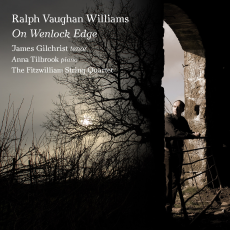Vaughan Williams - James Gilchrist - Atlanta Audio Society
James Gilchrist began his working life as a doctor, becoming a full-time recitalist and opera singer only in 1996. Medicine's loss is most demonstrably music's gain, for which the English tenor's latest Linn Records release provides abundant evidence. His voice is true, honest, and sensitive to every nuance in the poetic text. His intelligent interpretations of English art songs are all the more gratifying to hear because the English composers (as opposed, say, to the composers of German lieder) have always tended to find their most consistent inspiration in their best poets.
That is particularly the case with A. E. Houseman, whose collection A Shropshire Lad has provided an endlessly rich vein for composers to mine. On this album, we have Ralph Vaughan Williams' song cycle On Wenlock Edge (which gives the album its title) and Ivor Gurney's Ludlow and Teme, both drawn from Houseman. Curiously, Houseman himself was reluctant to allow his verses to be set to music, and it was only late in life that he ever heard any of these settings, in the form of a phonograph record of the Vaughan Williams cycle. Apparently, the poet never got any further than the third song, "Is my team ploughing," and was allegedly incensed that the composer had left out two of his verses. To which VW replied that a composer may choose what verses he will as long as he does not alter the sense of a poem, and besides "a poet should be grateful to anyone who fails to perpetuate such lines as ‘The goal stands up, the keeper / stands up to keep the goal.' "
Granted, that particular stanza is not terribly inspired. After all, what else is the goalie in a soccer (oops, football) match supposed to do? But perhaps it fits the irony of the poem that in all things, everyday as well as momentous, life goes on after the speaker has died. And VW certainly rose to the occasion in the final lines "I cheer a dead man's sweetheart, / Never ask me whose." Here, we have a powerful contrast between the intense feeling of the first line, in which the surging emotion of the singer is reinforced by the equal intensity of piano and string quartet, and the quietly understated second line, repeated in a brief coda.
In all the Vaughn Williams and Gurney songs, the string quartet makes itself felt in addition to the insightful accompaniment of Gilchrist's excellent partner, pianist Anna Tilbrook. The presence of the world-class Fitzwilliam String Quartet is not overkill, as they sensitively develop and reinforce the mood of these songs and the other works on the program as well, Peter Warlock's The Curlew (after William Butler Yeats) and Arthur Bliss' setting of the dignified, nobly understated emotion in Cecil Day Lewis' Elegiac Sonnet. That is important because, in this recital sound and sense compliment each other to an extraordinarily high degree.
The beauties in this recital are impossible to enumerate in a short review. In VW's setting of "Bredon Hill" we virtually see as well as hear the skylarks soaring and delight with the poet's lovers in the view of the patchwork quilt of the fields, the "coloured counties" seen from Bredon Hill on a summer's morning. In the Warlock song, the progress of emotion, thought and mood is helped by the presence of Gareth Hulse's cor anglais as an objective correlative for the curlew, a water bird in whose distinctively poignant cry the speaker hears his own thoughts of loss and desolation. The Gurney selections from Houseman are more varied in mood and treatment than those heard earlier. In his setting of "Ludlow Fair" you can hear the happy footfalls of the line "The lads in their hundreds to Ludlow come in for the fair" (typically the mood changes, as Houseman's Shropshire Lad muses pensively on "the lads who will die in their glory and never be old").
Summing up, we have great settings of memorable poetry, plus a singer, James Gilchrist, and instrumental partners who are keenly attuned to the patterns of sound=sense in the music. (This is one English song recital that the English-speaking listener doesn't have to follow with the song lyrics in the booklet to understand.) Add the first-rate recording by producer-engineer Philip Hobbs, and you have an award-class production (Gramophone, are you listening?)

